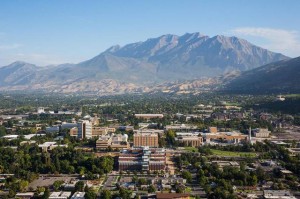
Recent BYU research shows that education plays an important role in the level of church activity for LDS members.
Sociology professors Tim B. Heaton and Cardell K. Jacobson researched the social life of members of The Church of Jesus Christ of Latter-day Saints. In one of their reports, they presented some social and religious characteristics of Church members.
Heaton and Jacobson’s research supports previous results that showed active Church members tend to have a higher level of education. They play a more central role in their church units and provide stability to their religious communities.
Church members have an educational advantage compared to the national population and higher educational levels than the population as a whole. Education is strongly and positively related to church attendance for Latter-day Saints, though church attendance nationwide may seem unrelated to education as a whole.
Mormons also report greater strength of religious identification than other Americans, and the trend in strength of identification is positive for Mormons, but negative for the country as a whole, Heaton said.
The surveys found that 83 percent of LDS said religion was “very important” to them. Nationally, only 56 percent of Americans said the same.
Considering both frequency of attendance and identification with religion, overall religion in the United States appears to be declining. The LDS Church, on the other hand, appeared to have slightly stronger religious attendance and identification within the past 40 years.
Trends for LDS Church attendance from the 1970s to the 1980s increased, then remained strong, Heaton said.
Why is it that Mormons increase their church attendance, while those outside of the Church seem to decrease in church attendance? Jacobson expressed the idea that those outside of the Church become educated in order to get ahead in the world. The key word there is “world.”
People grasp on to the philosophies of man and their own abilities when they believe they know more than others. This leaves them thinking they no longer need God in their lives, Jacobson said.
The LDS Church has a lay ministry, meaning none of the its leaders are paid. Church members are given callings and are asked to serve in certain areas of the Church.
“My sense is that since we have a lay ministry, it is really your calling that really integrates you into the LDS Church,” Heaton said. “You get to know people and feel like you’re needed. It requires you to be there every week to take care of your responsibilities.”
Heaton said that on average, people with better education are better able to fulfill their callings in the Church. They are able to lead discussions, organize activities and keep track of budgets, and they possess musical abilities and leadership skills to take charge.
Research from General Social Surveys found that Mormons play a more active role in the Church than do their national counterparts. 75 percent of Mormons say they attend religious services once a week or more (compared to 39 percent of the national sample).
LDS members reported they pray several times a day (66 percent compared to 38 percent of the national sample) and read scriptures outside of religious services (76 percent compared to 35 percent).
Heaton and Jacobson said at least part of the explanation for these results is that LDS congregations have no professional ministry, so most positions are filled by lay members, which shows more commitment from the members.
“So the link goes more education, more able to do callings and so more integrated into the LDS community,” Heaton said. “So that’s what creates this stronger, positive correlation between education and church attendance among Mormons than among most other groups.”
This is significant because it makes it clear that education influences not only business success and career placement but also religious involvement, helping others and becoming better people, Jacobson said.
For most Mormons, Jacobson said, church education and secular education have a strong affiliation. This education is meant to extend beyond the days of schooling. Schooling helps in developing skills and talents that can then be shared with others.
“The university (BYU) and the Church want us to become adept to serving others, whether it be in the Church or out of it,” Jacobson said.
Jacobson said education is a blessing and is for an eternal purpose. “We come to learn so we can be prepared to serve,” he said.




